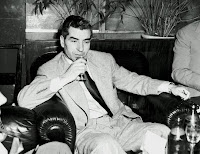
From the Library of Congress to a pauper’s few books set by a rumpled bed, for me a library (lib(e)r: books), becomes itself if there are more than one book, although theologians might find fault with my arithmetic and consider anything beyond the Bible (papyrus—Býblos, a Phoenician port where papyrus was prepared and exported) as insignificant. Two books would be a library. Three books would be a librārius.
I’ve always found yard-sale libraries to be interesting: those musty cardboard boxes of books jettisoned by family members of a deceased reader or tables of stacked, spine-cracked Louis L’Amour paperbacks next to faded tomes about electrical engineering or celestial navigation. I never find anything to buy—I’m still looking for that first edition of Leaves of Grass—but I do get a glimpse into the mind and imagination of a stranger’s life and I catalogue that as a kind of vicarious experience which might appear somewhere in a future poem.
One of the oddest libraries I’ve discovered was read by Gregory Corso, the American Beat poet. That library existed at the Clinton Correctional Maximum Security Prison in New York, where Corso had been confined for the heinous crime of breaking into a classroom one winter night to stay warm. At Clinton he was given Lucky Luciano’s vacated cell, complete with Luciano’s donated library and a special light installed for the Mafia don to allow after-lights reading.
I do not know what books were in Luciano’s library (certainly there were Greek and Roman classics) but when Corso was released back into New York, Allen Ginsburg—after reading one of the young poet’s poems—recognized his brilliance.
When I read Corso’s earliest work again, his classical templates from the 50s Vestal Lady collection, I end up thanking Lucky Luciano for his reading tastes.



